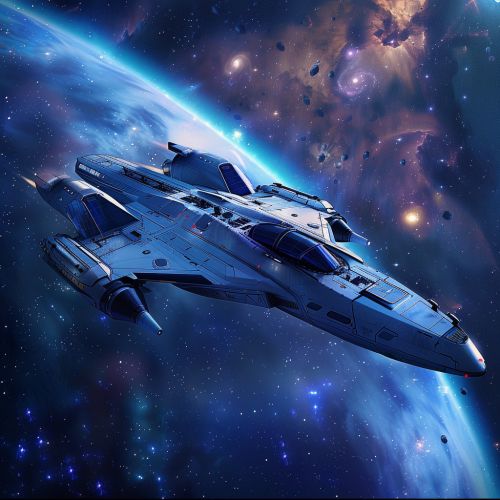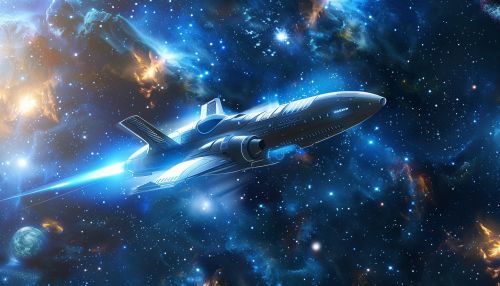Science fiction
Origins
Science fiction (SF) is a genre of speculative fiction that typically deals with imaginative and futuristic concepts such as advanced science and technology, space exploration, time travel, parallel universes, and extraterrestrial life. It has been called the "literature of ideas", and often explores the potential consequences of scientific, social, and technological innovations.
The origins of science fiction can be traced back to the Age of Enlightenment, where the concept of using reason and science to explain the natural world began to emerge. This led to the creation of speculative fiction, which would later evolve into science fiction. The first known science fiction story is "A True Story", written by the Greek-speaking Syrian author Lucian of Samosata in the 2nd century AD. In the story, Lucian uses elements of space travel and extraterrestrial life, concepts that are now synonymous with the genre.


Development
The development of science fiction as a genre began in earnest during the 19th century with the works of Jules Verne and H.G. Wells. Verne's novels, including "Twenty Thousand Leagues Under the Sea" and "Around the World in Eighty Days", are considered some of the earliest examples of hard science fiction, a subgenre of science fiction characterized by an emphasis on scientific accuracy. Wells, on the other hand, is known for his works "The Time Machine" and "War of the Worlds", which are considered soft science fiction due to their focus on character and societal issues over scientific details.
The genre continued to evolve and expand during the 20th century, with the emergence of pulp magazines such as "Amazing Stories" and "Astounding Science Fiction". These publications were instrumental in popularizing science fiction and introducing it to a wider audience. They also served as a platform for many of the genre's most influential authors, including Isaac Asimov, Arthur C. Clarke, and Robert A. Heinlein.
Subgenres
Science fiction is a broad genre that encompasses a wide range of themes and styles. It is often divided into subgenres, each with its own unique characteristics and conventions. Some of the most notable subgenres include hard science fiction, soft science fiction, cyberpunk, space opera, and dystopian fiction.
Hard science fiction is characterized by its rigorous attention to accurate detail in the natural sciences. This subgenre is exemplified by the works of authors such as Isaac Asimov and Arthur C. Clarke. Soft science fiction, on the other hand, is less concerned with scientific accuracy and more focused on social sciences like psychology, sociology, and politics. Notable authors in this subgenre include Ursula K. Le Guin and Philip K. Dick.
Cyberpunk is a subgenre that combines science fiction with noir and focuses on "high tech and low life" scenarios involving advanced technology and societal breakdown or radical change. William Gibson's "Neuromancer" is often cited as the seminal work in this subgenre.
Space opera is a subgenre characterized by space warfare, melodramatic adventure, interplanetary battles, as well as chivalric romance, and often risk-taking. Notable space opera works include the "Star Wars" franchise and the "Dune" series by Frank Herbert.
Dystopian fiction is a subgenre that explores social and political structures in a dark, nightmare world. Classic examples of dystopian science fiction include George Orwell's "1984" and Aldous Huxley's "Brave New World".
Influence and Criticism
Science fiction has had a significant influence on modern culture, particularly in terms of its impact on science and technology. Many concepts and technologies that were once purely the realm of science fiction, such as artificial intelligence, space travel, and virtual reality, are now realities or are currently being developed.
However, the genre has also faced criticism for its perceived lack of literary merit. Critics argue that science fiction is often poorly written, overly focused on plot and ideas at the expense of character development, and reliant on clichéd tropes and conventions. Despite this, the genre has produced numerous works that are recognized for their literary quality, including "Dune" by Frank Herbert and "Neuromancer" by William Gibson.
Conclusion
Science fiction is a diverse and complex genre that continues to evolve and influence our understanding of the world and the future. From its origins in the Age of Enlightenment to its current status as a major cultural force, science fiction has consistently pushed the boundaries of what is possible in literature and in life.
See Also
Cyberpunk - A subgenre of science fiction focusing on "high tech and low life" scenarios. Space Opera - A subgenre of science fiction characterized by space warfare, melodramatic adventure, and interplanetary battles. Dystopian Fiction - A subgenre of science fiction that explores social and political structures in a dark, nightmare world.
